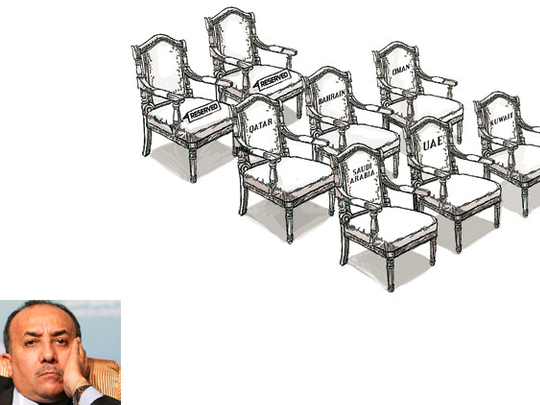
The Gulf Cooperation Council states over the past three decades have been known for their measured and glacial moves. Suddenly, the decision in their recent consultative summit to extend membership to Jordan in the Levant and Morocco on the Atlantic coast, to join their exclusive club, marked a tectonic shift. This comes as the GCC states grapple to stay afloat against a resurgent Iran, failed-state Iraq, troubled Yemen and the ongoing Arab Spring.
The whole Gulf region is still reeling from this hasty decision, which not only took everyone by surprise but caused a lot of official consternation, mainly among the outspoken Kuwaiti parliamentarians and people alike. The sudden announcement sparked a barrage of comments and raised more questions than answers. The social media in the region was abuzz with a lot of negative and disparaging comments. Pundits and analysts were busy analysing the reasons and the consequences of the decision. I personally conducted six interviews for Kuwaiti, Gulf and even Algerian news outlets.
The pressing inquiries focused on the reasons, the objectives, and the timing. Others questioned the choice: Why Jordan and Morocco? What do they have in common with us? Of course no one can miss the similarities in the political systems of these two monarchies with the ruling families in the GCC states. In addition, both Jordan and Morocco have suffered Iran's mischievous meddling and are allied with the western powers and are free market economies. But both need a lot of cash infusion and direct investment.
Others questioned the shape and the future of this alliance (6+2) formula and whether it is an alliance of monarchies to face off the Arab revolts, or hedging their bets if the western allies have a change of heart as they helped depose their long-time allies. A Kuwaiti MP went so far as to suspect it was a move to normalise ties with Israel! There is no doubt that the Arab landscape is witnessing unprecedented changes and upheavals.
The GCC was formed 30 years ago to fend off imminent dangers and threats emerging from the Iranian revolution, and its declared intention of exporting its revolution to the Arab side of the Gulf. This was exacerbated by the Iran-Iraq war, the Soviet invasion of Afghanistan and the declaration of former US president Jimmy Carter that the Gulf region is a strategic domain of US national interest, and the US was willing to use force to defend its interests. This came to be known as the Carter doctrine. Since then, the GCC alliance was found wanting. The might of the GCC states — with the exception of Saudi Arabia — in comparison with the two major regional powers, Iran and Iraq, was clear. The lack of a regional balance of power has bedevilled the region for decades. The collective GCC military power was no match to the menacing Iraqi military might and the Iranian forces.
Guarded approach
After three decades of failed strategies, a new architecture seems to be in the making. The challenge is will it deliver? The overall reaction ranged between rejection and astonishment. How could a strategic and far-reaching decision to enlarge the GCC membership to include Jordan and Morocco be taken in such an impromptu manner? It was not surprising to hear negative and dismissive opinions, from the public and experts alike, about the real objectives of such an alliance and its end results and objectives. There are some legitimate questions: Is there unanimity over this decision? Especially after Al Qabas, an independent Kuwaiti daily splashed a headline indicating the reservations of Kuwait, Qatar and Oman over the hasty decision and demanding a more gradual and guarded approach to admit the two countries.
Will this alliance be a security and military alliance, or an economic-political one? Is it an Arab Nato? Or a mini-Arab League, to replace the dysfunctional Arab League? What is the cost of such a move and, more importantly, what is the added value of the expansion? Who will benefit and who will pick up the bill? What about the consequences of such a strategic shift on the GCC itself? Will it muddy the rift and bickering over economic integration, and common currency?
One Kuwaiti newspaper publisher declared unabashedly that this will signal the end of the GCC as an alliance while other commentators in the GCC and the wider Arab world, especially in Egypt, argued this would deal a major blow to the future of the Arab League.
The GCC leadership has to come out and explain to its citizens who enjoy one of the highest per capita incomes not only in the region but in the world, what is in it for us. How could we expand all the way to the Atlantic Ocean? The GCC charter talks about the need for member states to border the Arabian Gulf. What kind of membership are we talking about? Is it a full membership or a partial one? Morocco expressed its reservations to limited membership and its reaction was lukewarm at best, while Jordan which sought the coveted GCC membership was ecstatic and welcomed a fast track membership. What is likely to happen is a long arduous process due to the divergent views among the GCC members, who think there is a need to study the issue further before offering a full membership. That means a limited and gradual membership or a monitoring status at best. Or a relationship similar to what the GCC states have with Iraq and Yemen. The GCC's bold initiative faces stiff public opposition. Some Kuwaiti parliamentarians are upping the ante rejecting the initiative altogether, while other MPs called for a referendum to approve the expansion. Stay tuned for more on the GCC's 30th birthday tectonic shift gift!
Professor Abdullah Al Shayji is the Chairman of the Political Science Department, Kuwait University.










